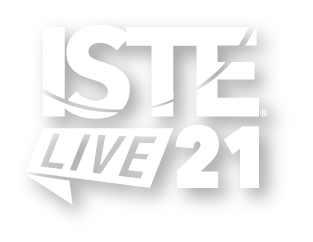

When Game-Based Learning and the Learning Sciences Collide |
Participate and share : Interactive lecture
Dr. Brandon Olszewski Bert Snow
In recent years, as game designers harnessing the strengths of game design, the learning sciences have been studying how we learn, and what is — and isn’t — effective. What happens when you create a game-based project about the learning sciences that must meet learning science best practices? Come see!
| Audience: | Professional developers, Teachers, Technology coordinators/facilitators |
| Skill level: | Beginner |
| Attendee devices: | Devices useful |
| Attendee device specification: | Smartphone: Android, iOS, Windows Laptop: Chromebook, Mac, PC Tablet: Android, iOS, Windows |
| Participant accounts, software and other materials: | None |
| Topic: | Games for learning & gamification |
| ISTE Standards: | For Educators: Learner
|
The field of Game Design provides a toolbox with many useful tools for creating engaging, effective learning experiences. Over the last few decades, many of us have been working with those tools, creating projects in the areas of learning games and simulations, or in the “gamification” of courses and curricula. Through this work, there’s a growing body of ideas (and some hype) on game-based-learning techniques, and how they can help.
Separately, the multiple fields that make up the Learning Sciences have been studying how we humans actually DO learn - and the processes and techniques that research shows to be effective.
In 2019, the presenters had the chance to develop two game-based learning Sims for a course about the Learning Sciences; the “Launch into Learning Sciences” course at courseofmind.org. The two sims are: “The Case of the Missing Motivation”
and “The Case of the Assignment Gone Awry”. (Access to one of the Sims will be provided for reviewers at the Reviewer Details link)
We wanted the sims to draw on game design AND embody Learning Science best practices, so we had to find the places where the two fields do - and don’t intersect.
Our work generated both insights and surprises -and the resulting “Sims” became something interesting and different: they became more of a mashup of Case Study, Comic Book, and Strategy Card Game...with a little Detective Novel. Probably the first such mashup!
The purpose of this presentation is to share what we learned in this process: where game design and the learning sciences agree, and some places where they do not. What we found also challenges some tenets of “gamification”.
The lessons will be useful for practitioners including instructional and game designers, developers, curriculum writers and teachers. It will enable them to use game design principles where they will actually help, and avoid some misconceptions.
Evidence of success: The learning activities covered in this episode are part of ISTE’s Course of Mind initiative. You can see what educators discovered about the power of the learning sciences for instruction and edtech selection in this video from ISTE 2019 (https://drive.google.com/file/d/1ugpMAbgXSUYykkQFkZqfFAGCG65QN0OG/view?usp=sharing). The learning sciences are a powerful tool for learning, and we’re excited to bring them to ISTE 2021.
The session will start with quick introductions to the learning sciences and game-based learning design, then introduce the goals and approach to the project. Attendees will join a live play-through of part of one of the Course of Mind sims we created. Then we’ll discuss the intersections of game design and learning sciences: where they worked together, where they disagreed, and insights into what works, and where some misconceptions around games were illuminated.
1. What do we mean by the Learning Sciences? (Olszewski) - 5 min
2. Game design and learning - a quick (optionated) overview (Snow) - 5 min
3. Course of Mind and the “Leap into the Learning Sciences” course and Sims project: Leveraging learning sciences and edtech to help teachers improve student learning (Olszewski) - 5 min
4. Our goals for the Sims and approach to game design and learning-science best-practices - 5 min
5. Attendees play an edited version of one of the Sims on their device (it’s cross-platform). (Interaction - everyone) - 15 min
6. Highlighting lessons from the project:
a. Where game-design and learning sciences agree (Snow, Olszewski, attendees) - 10 min
b. Where they disagree - and some potholes and misconceptions in gamification. (Snow, Olszewski, attendees) - 10 min
7. Attendees share stories from their own projects and work - where has game design worked - or not? How are they incorporating learning sciences insights? (Attendees) - 5 min
GAME DESIGN AND LEARNING
Snow, Bert (2016) The Potential for Game-based Learning to Improve Outcomes for Nontraditional Students, Muzzy Lane Software, with funding from the Gates Foundation
Richard E. Mayer, Computer Games for Learning, MIT Press, 2014
Better Learning in Games: A Balanced Design Lens, J. Groff, J. Clarke-Midura, V.E. Owen, L. Rosenheck, Better Learning in Games: A Balanced Design Lens, The Learning Games Network, MIT, 2014
D.B. Clark, E. Tanner-Smith, S. Killingsworth, Digital Games, Design, and Learning: A Systematic Review and Meta-Analysis, D.B. Clark, E. Tanner-Smith, S. Killingsworth, SRI Education, 2014
Jesse Schell, The Art of Game Design: A Book of Lenses, A K Peters/CRC Press; 3rd Edition (August 27, 2019)
THE LEARNING SCIENCES
The Course of Mind resources page has a rich set of research and information from the learning sciences.
https://courseofmind.org/resources

